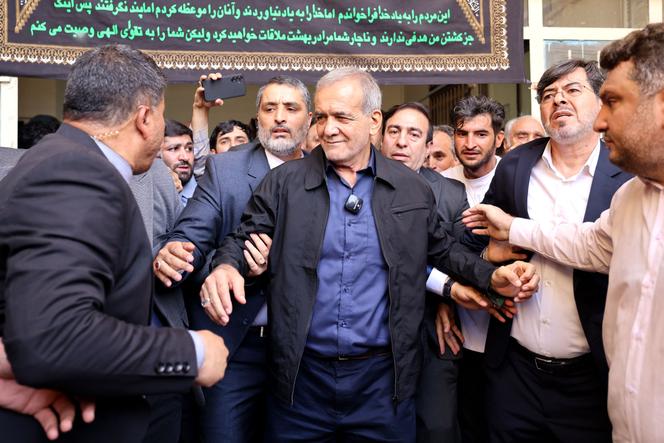


Reformist candidate Masoud Pezeshkian speaks softly and uses simple and modest words. His supporters are leaning heavily on this trait to win over voters in the presidential run-off, which will take place on Friday, July 5, a week after the first round was organized in haste after the death of President Ebrahim Raisi in a helicopter crash on May 19.
Pezeshkian, a physician by profession, came out on top on June 28, with 42.5% of the vote, compared to 38.6% for his rival, the ultra-conservative candidate Saeed Jalili. Yet the election was marked mainly by an abstention rate of around 60%, a record in the history of the Islamic Republic of Iran. And for good reason: Many consider the president to have little weight in the face of Supreme Leader Ali Khamenei.
The 70-year-old Pezeshkian was minister of health during reformist President Mohammad Khatami's second term, between 2001 and 2005. He often brings up his former job position to compare himself with his opponent, who has never held an important government position. Originally from the Kurdish town of Mahabad in the northeast of the country, he is fluent in the Kurdish and Azeri dialects. In the provinces populated by these two minorities, he came out clearly ahead of his opponent in the first round.
A member of the country's political elite as well as a doctor specializing in general and cardiac surgery, Pezeshkian made a name for himself by defending the opposition. In 2009, when he was a member of parliament, he dared to criticize the repression of Iranians who took to the streets against the "fraudulent" re-election of ultra-conservative President Mahmoud Ahmadinejad. Considered an offense to Khamenei, who had called for a harsh crackdown on the demonstrations, Pezeshkian's statements earned him the wrath of the conservative camp. "You're not being fair. You should also condemn those who do not accept the election result," said Gholam-Ali Haddad-Adel, the conservative head of parliament at the time.
Even today, Pezeshkian is trying to play up his image as a "moderate" to appeal to Iranians from big cities who belong to the middle class, impoverished by the austere policies of successive governments, international sanctions and endemic corruption. He also hopes to attract women and Gen Z voters, who seem to represent a large proportion of the abstentionist vote, although no polls have been published to support this hypothesis. Both groups were deeply scarred by the repression that hit the protest movement brought about by Mahsa (Jina) Amini's death in September 2022 after her arrest by the morality police for wearing clothing deemed "insufficiently Islamic."
You have 57.2% of this article left to read. The rest is for subscribers only.
